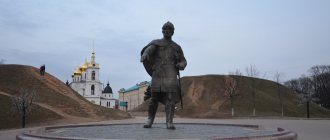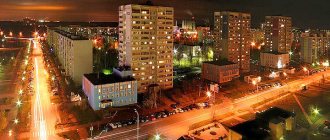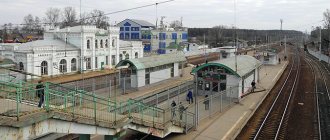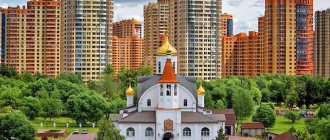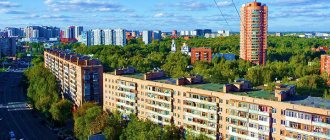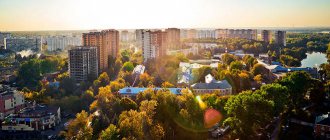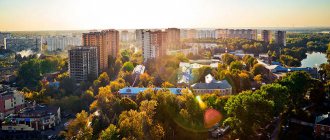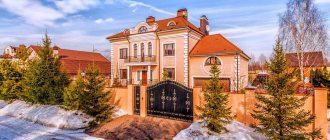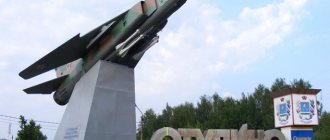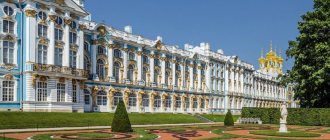For other places with the same name, see Dedovsk (populated area).
City in Moscow region, Russia
| Dedovsk Dedovsk | |
| Town[1] | |
| Branch of the Russian State Social University in Dedovsk | |
| Flag Coat of arms | |
| Location Dedovsk | |
| Dedovsk Location Dedovsk Show map of Russia Dedovsk Dedovsk (Moscow region) Show map of the Moscow region | |
| Coordinates: 55°51′N 37°07′E / 55.850°N W. 37.117°E / 55.850; 37.117Coordinates: 55°51′N 37°07′E / 55.850°N W. 37.117°E / 55.850; 37.117 | |
| A country | Russia |
| Federal subject | Moscow region[1] |
| Administrative region | Istra district[1] |
| Town | Dedovsk[1] |
| First mention | 1573 |
| City status from | 1940 |
| Height | 170 m (560 ft) |
| population (2010 Census)[2] | |
| • General | 29,108 |
| Administrative status | |
| • Capital from | G. Dedovsk[1] |
| Municipal status | |
| • Municipal district | Istra municipal district[3] |
| • Urban village | Urban settlement Dedovsk[3] |
| • Capital from | Urban settlement Dedovsk[3] |
| Timezone | UTC + 3 (MSK [4]) |
| Postal code(s)[5] | 143530, 143532 |
| Dial code(s) | +7 49631 |
| OKTMO I WOULD | 46618103001 |
Dedovsk
(Russian: Де́довск) is a town in the Istra District of Moscow Oblast, Russia, located 38 km (24 mi) west of Moscow and 30 km (19 mi) southeast of Istra, then the administrative center of the district.
Population: 29,108 (2010 Census);[2]27,662 (2002 Census);[6]30,740 (1989 Census).[7] It was previously known as Dedovo/Dedovsky
(until 1940).
History of origin
The city of Dedovsk was formed largely thanks to the railroad passing nearby (though at that time it was not yet a city at all), then a spinning factory arose here (the famous Dedovskaya manufactory), to build a factory building, a brick factory was founded nearby...
This is how the city of Dedovsk was built along a chain, conquering lands for itself from the swamp. Actually, this was not Dedovsk yet - it was Guchkovo, as the area was called after the nearest railway station.
Then there was its own bakery, ceramic production, and in recent years (and now we are talking about the city of Dedovsk) there has been rapid construction of apartment buildings and residential complexes.
Natives of the city
Religious figures
- Smirnov Alexey Vasilievich (born May 24, 1955) is the current chairman of the Russian Union of Evangelical Christian Baptists.
Military personnel
- Makov Vladimir Nikolaevich - guard captain of the Red Army, during the war he served in the 136th Rezhetsk Red Banner brigade of army cannon artillery. On April 30, 1945, during the capture of the Reichstag, he commanded the assault group that was the first to hoist the red banner over the main entrance of the western part of the building, which was announced at 10 p.m. 30 min. reported over the radio to headquarters: “They stuck some German bl... in the head,” referring to the crown of the “Goddess of Victory” statue[29].
Cultural figures
- Madyanov Vadim Sergeevich (born November 23, 1959) is a Soviet and Russian film actor and film director.
- Madyanov Roman Sergeevich (born July 22, 1962) is a Soviet and Russian theater and film actor, known to television viewers for his roles in the TV series “Penal Battalion,” “Soldiers,” “Garages” and other works, Honored Artist of Russia.
- Semina Olga Evgenvna (born September 18, 1983) is a Russian film actress, known to viewers for her work in the TV series “Poor Nastya”
Athletes
- Valery Vladimirovich Jordan (born March 12, 1992) is a Russian track and field athlete (javelin throw), silver medalist of the 2012 European Championship (Helsinki), Master of Sports of Russia of international class.
- Ukraintsev Vadim Vladimirovich (born March 24, 1966) - kickboxer athlete, World Champion, two-time European Champion, USSR Kickboxing Champion, President of the Moscow Region Kickboxing Federation, First Vice-President of the Russian Federation, head coach of the Russian kickboxing team, Honored Coach of Russia [thirty].
- Shirokov Roman Nikolaevich (born July 6, 1981) is a football player, player of the Moscow FC Spartak, midfielder of the Russian national football team, Honored Master of Sports of Russia.
- Lukashov Denis Pavlovich (born April 25, 1985) is a kickboxer athlete, a student of Vadim Ukraintsev, five-time World Champion and three-time Russian Champion in kickboxing, winner of the First World Martial Arts Games in Beijing, coach of the Profi-Sport club[31].
- Sergei Iosifovich Vyshedkevich (born January 3, 1975) - hockey player, defenseman.
Property Features
New residential buildings in Dedovsk are modern, beautiful and well-thought-out (many with improved layouts) present a striking contrast with the preserved barracks of the workers of the Dedovskaya manufactory.
Few people know, but a hundred years ago local residents lived mainly in brick barracks, each room (there were 536 in total) with an area of 14 meters should have been intended for a family, but due to the abundance of workers, the rooms were compacted, and there were only three (!) sq.m. area.
After the revolution, the severity of the housing problem was alleviated both through the construction of new houses and through the annexation of surrounding territories, when in 1928 Dedovsk expanded significantly. For a long time, the basis of its development remained five-story buildings, until in 1971 the first 9-story building in the city was erected.
Attractions
Not far from the city there is the Snegiri memorial complex (in the village of Lenino) with a museum and samples of armored vehicles displayed in the open air, including the legendary German “Tiger”. Here you can touch and feel everything.
Within a few minutes by car you can reach the New Jerusalem Monastery. If you like the slightly patriarchal, measured Dedovsk, then most likely you will enjoy leisurely walks in the Garden of Gethsemane, the underground Church of Constantine and Helen, a walk along the monastery walls...
You will come back here to look at all the exhibits of the local history museum and enjoy the beauty and tranquility of these places. Here you can study the history of Orthodoxy, touch shrines, look at beautiful architecture and take a walk in the park.
It is also worth spending time in Istra itself, a city restored after the war (and in fact, rebuilt), especially since the general environmental situation in the Istra region is only favorable for this.
Infrastructure
In Dedovsk there is a stadium, a clinic and a hospital, there are cultural centers, shops, schools and kindergartens, and there are convenient transport routes connecting all districts of the city.
There is practically no air-polluting industry here (the indicator for the region is 4-6%, which is several times less than the weighted average for the Moscow region), therefore, in this region and its surroundings there are practically no violations of sanitary air standards and excesses of background radiation.
Choosing real estate in Dedovsk is worth it for those who value relative peace and lack of fuss, but for a number of reasons do not want (or are not ready) to travel far from the capital.
Thus, country houses and apartments in new buildings in Dedovsk are a comfortable place to live, especially if you let into your life the maximum of provincial calm, tranquility and patriarchy of a small town, where neighbors are friends, sellers in shops and markets recognize you, and in the evening along the street go safely.
Did you find this article helpful? Please share it on social networks: Don't forget to bookmark the Nedvio website. We talk about construction, renovation, and country real estate in an interesting, useful and understandable way.
Excerpt characterizing Dedovsk
- No, I’ll do it myself, just teach me. Everything is easy for you,” she added, responding to her smile. - If only you could see how he told me this! After all, I know that he didn’t mean to say this, but he said it by accident. - Well, you still have to refuse. - No, don't. I feel so sorry for him! He is so cute. - Well, then accept the offer. “And then it’s time to get married,” the mother said angrily and mockingly. - No, mom, I feel so sorry for him. I don't know how I'll say it. “You don’t have anything to say, I’ll say it myself,” said the countess, indignant that they dared to look at this little Natasha as if she were big. “No, no way, I myself, and you listen at the door,” and Natasha ran through the living room into the hall, where Denisov was sitting on the same chair, by the clavichord, covering his face with his hands. He jumped up at the sound of her light steps. “Natalie,” he said, approaching her with quick steps, “decide my fate.” It's in your hands! - Vasily Dmitrich, I feel so sorry for you!... No, but you are so nice... but don’t... this... otherwise I will always love you. Denisov bent over her hand, and she heard strange sounds, incomprehensible to her. She kissed his black, matted, curly head. At this time, the hasty noise of the countess's dress was heard. She approached them. “Vasily Dmitrich, I thank you for the honor,” said the countess in an embarrassed voice, but which seemed stern to Denisov, “but my daughter is so young, and I thought that you, as a friend of my son, would turn to me first.” In this case, you would not put me in the need of refusal. “Gafinya,” Denisov said with downcast eyes and a guilty look, he wanted to say something else and faltered. Natasha could not calmly see him so pitiful. She began to sob loudly. “Countess, I am guilty before you,” Denisov continued in a broken voice, “but know that I adore your daughter and your entire family so much that I would give two lives...” He looked at the countess and, noticing her stern face... “Well, farewell, lady,” he said, kissed her hand and, without looking at Natasha, walked out of the room with quick, decisive steps. The next day, Rostov saw off Denisov, who did not want to stay in Moscow for another day. Denisov was seen off at the gypsies by all his Moscow friends, and he did not remember how they put him in the sleigh and how they took him to the first three stations. After Denisov’s departure, Rostov, waiting for the money that the old count could not suddenly collect, spent another two weeks in Moscow, without leaving the house, and mainly in the young ladies’ room. Sonya was more tender and devoted to him than before. She seemed to want to show him that his loss was a feat for which she now loves him even more; but Nikolai now considered himself unworthy of her. He filled the girls' albums with poems and notes, and without saying goodbye to any of his acquaintances, finally sending all 43 thousand and receiving Dolokhov's signature, he left at the end of November to catch up with the regiment, which was already in Poland. After his explanation with his wife, Pierre went to St. Petersburg. In Torzhok there were no horses at the station, or the caretaker did not want them. Pierre had to wait. Without undressing, he lay down on a leather sofa in front of a round table, put his big feet in warm boots on this table and thought. – Will you order the suitcases to be brought in? Make the bed, would you like some tea? – asked the valet. Pierre did not answer because he did not hear or see anything. He began to think at the last station and continued to think about the same thing - about something so important that he did not pay any attention to what was happening around him. Not only was he not interested in the fact that he would arrive in St. Petersburg later or earlier, or whether he would or would not have a place to rest at this station, but it was still in comparison with the thoughts that occupied him now whether he would stay for a few days. hours or a lifetime at this station. The caretaker, the caretaker, the valet, the woman with Torzhkov sewing came into the room, offering their services. Pierre, without changing his position with his legs raised, looked at them through his glasses, and did not understand what they could need and how they could all live without resolving the questions that occupied him. And he was preoccupied with the same questions from the very day he returned from Sokolniki after the duel and spent the first, painful, sleepless night; only now, in the solitude of the journey, did they take possession of him with special power. No matter what he started to think about, he returned to the same questions that he could not solve, and could not stop asking himself. It was as if the main screw on which his whole life was held had turned in his head. The screw did not go in further, did not go out, but spun, not grabbing anything, still on the same groove, and it was impossible to stop turning it. The caretaker came in and humbly began to ask His Excellency to wait only two hours, after which he would give courier for His Excellency (what will happen, will happen). The caretaker was obviously lying and only wanted to get extra money from the passerby. “Was it bad or good?” Pierre asked himself. “For me it’s good, for another person passing through it’s bad, but for him it’s inevitable, because he has nothing to eat: he said that an officer beat him for this. And the officer nailed him because he needed to go faster. And I shot at Dolokhov because I considered myself insulted, and Louis XVI was executed because he was considered a criminal, and a year later they killed those who executed him, also for something. What's wrong? What well? What should you love, what should you hate? Why live, and what am I? What is life, what is death? What force controls everything?” he asked himself. And there was no answer to any of these questions, except one, not a logical answer, not to these questions at all. The answer was: “If you die, everything will end. You’ll die and find out everything, or you’ll stop asking.” But it was also scary to die. The Torzhkov merchant offered her goods in a shrill voice, especially goat shoes. “I have hundreds of rubles that I have nowhere to put, and she stands in a torn fur coat and timidly looks at me,” thought Pierre. And why is this money needed? Can this money add exactly one hair to her happiness, peace of mind? Could anything in the world make her and me less susceptible to evil and death? Death, which will end everything and which should come today or tomorrow, is still in a moment, in comparison with eternity.” And he again pressed the screw that was not gripping anything, and the screw still turned in the same place. His servant handed him a book of the novel in letters to m m e Suza, cut in half. [Madame Suza.] He began to read about the suffering and virtuous struggle of some Amelie de Mansfeld. [Amalia Mansfeld] “And why did she fight against her seducer,” he thought, “when she loved him? God could not put into her soul aspirations that were contrary to His will. My ex-wife didn't fight and maybe she was right. Nothing has been found, Pierre told himself again, nothing has been invented. We can only know that we know nothing. And this is the highest degree of human wisdom." Everything in himself and around him seemed to him confusing, meaningless and disgusting. But in this very disgust for everything around him, Pierre found a kind of irritating pleasure. “I dare to ask your Excellency to make room for a little bit, for them,” said the caretaker, entering the room and leading behind him another traveler who had been stopped for lack of horses. The man passing by was a squat, broad-boned, yellow, wrinkled old man with gray overhanging eyebrows over shiny eyes of an indeterminate grayish color. Pierre took his feet off the table, stood up and lay down on the bed prepared for him, occasionally glancing at the newcomer, who with a sullenly tired look, without looking at Pierre, was heavily undressing with the help of a servant. Left in a worn-out sheepskin coat covered with nankin and in felt boots on thin, bony legs, the traveler sat down on the sofa, leaning his very large, short-cropped head, wide at the temples, against the back and looked at Bezukhy. The stern, intelligent and insightful expression of this look struck Pierre. He wanted to talk to the passerby, but when he was about to turn to him with a question about the road, the passerby had already closed his eyes and folded his wrinkled old hands, on the finger of one of which there was a large cast-iron ring with the image of Adam’s head, sat motionless, either resting, or about thinking deeply and calmly about something, as it seemed to Pierre. The traveler's servant was covered with wrinkles, also a yellow old man, without a mustache or beard, which apparently had not been shaved, and had never grown on him. A nimble old servant dismantled the cellar, prepared the tea table, and brought a boiling samovar. When everything was ready, the traveler opened his eyes, moved closer to the table and poured himself one glass of tea, poured another for the beardless old man and handed it to him. Pierre began to feel uneasy and necessary, and even inevitable, to enter into a conversation with this passing person. The servant brought back his empty, overturned glass with a half-eaten piece of sugar and asked if anything was needed. - Nothing. “Give me the book,” said the passerby. The servant handed him a book, which seemed spiritual to Pierre, and the traveler began to read. Pierre looked at him. Suddenly the traveler put the book aside, laid it closed, and, again closing his eyes and leaning on the back, sat down in his previous position. Pierre looked at him and did not have time to turn away when the old man opened his eyes and fixed his firm and stern gaze straight into Pierre’s face. Pierre felt embarrassed and wanted to deviate from this gaze, but the brilliant, senile eyes irresistibly attracted him to them. “I have the pleasure of speaking with Count Bezukhy, if I’m not mistaken,” said the traveler slowly and loudly. Pierre silently and questioningly looked through his glasses at his interlocutor. “I heard about you,” continued the traveler, “and about the misfortune that befell you, my lord.” “He seemed to emphasize the last word, as if he said: “yes, misfortune, whatever you call it, I know that what happened to you in Moscow was a misfortune.” “I’m very sorry about that, my lord.” Pierre blushed and, hastily lowering his legs from the bed, bent over to the old man, smiling unnaturally and timidly. “I didn’t mention this to you out of curiosity, my lord, but for more important reasons.” “He paused, not letting Pierre out of his gaze, and shifted on the sofa, inviting Pierre to sit next to him with this gesture. It was unpleasant for Pierre to enter into conversation with this old man, but he, involuntarily submitting to him, came up and sat down next to him. “You are unhappy, my lord,” he continued. -You are young, I am old. I would like to help you to the best of my ability. “Oh, yes,” Pierre said with an unnatural smile. - Thank you very much...Where are you passing from? “The face of the traveler was not kind, even cold and stern, but despite that, both the speech and the face of the new acquaintance had an irresistibly attractive effect on Pierre. “But if for some reason you don’t like talking to me,” said the old man, “then just say so, my lord.” - And he suddenly smiled unexpectedly, a fatherly tender smile. “Oh no, not at all, on the contrary, I’m very glad to meet you,” said Pierre, and, looking again at the hands of his new acquaintance, he took a closer look at the ring. He saw Adam's head on it, a sign of Freemasonry. “Let me ask,” he said. -Are you a Mason? “Yes, I belong to the brotherhood of free stonemasons,” said the traveler, looking deeper and deeper into Pierre’s eyes. “Both on my own behalf and on their behalf, I extend a brotherly hand to you.” “I’m afraid,” said Pierre, smiling and hesitating between the trust instilled in him by the personality of a Freemason, and the habit of mocking the beliefs of the Freemasons, “I’m afraid that I’m very far from understanding how to say this, I’m afraid that my way of thinking about everything the universe is so opposite to yours that we will not understand each other. “I know your way of thinking,” said the Mason, “and that way of thinking that you are talking about, and which seems to you to be the product of your mental labor, is the way of thinking of most people, it is the monotonous fruit of pride, laziness and ignorance.” Excuse me, my lord, if I did not know him, I would not have spoken to you. Your way of thinking is a sad delusion. “Just as I can assume that you are also in error,” said Pierre, smiling faintly. “I will never dare to say that I know the truth,” said the Mason, more and more striking Pierre with his certainty and firmness of speech. – No one alone can reach the truth; “Only stone by stone, with the participation of everyone, millions of generations, from the forefather Adam to our time, is the temple being erected, which should be a worthy dwelling of the Great God,” said the Mason and closed his eyes. “I must tell you, I don’t believe, I don’t... believe in God,” Pierre said with regret and effort, feeling the need to express the whole truth. The Mason looked carefully at Pierre and smiled, as a rich man holding millions in his hands would smile at a poor man who would tell him that he, the poor man, did not have five rubles that could make him happy. “Yes, you don’t know Him, my lord,” said the Mason. – You cannot know Him. You don't know Him, that's why you're unhappy. “Yes, yes, I’m unhappy,” Pierre confirmed; - but what should I do? “You don’t know Him, my sir, and that’s why you are very unhappy.” You don't know Him, but He is here, He is in me. He is in my words, He is in you, and even in those blasphemous speeches that you have uttered now! – the Mason said in a stern, trembling voice. He paused and sighed, apparently trying to calm down. “If He didn’t exist,” he said quietly, “you and I wouldn’t be talking about Him, my sir.” What, who were we talking about? Who did you deny? - he suddenly said with enthusiastic sternness and authority in his voice. – Who invented Him if He doesn’t exist? Why did you have the assumption that there is such an incomprehensible creature? Why did you and the whole world assume the existence of such an incomprehensible being, an omnipotent being, eternal and infinite in all its properties?... - He stopped and was silent for a long time.
